Small business owners have their work cut out for them. Not only do they have to manage the day-to-day operations of their businesses, but they also have to find time to market them effectively.
However, marketing can be both challenging and expensive. It’s hard to compete with the big guys regarding visibility; traditional advertising methods can be prohibitively expensive.
But there is another way: content marketing.
Content marketing is a cost-effective way to reach your target market without breaking the bank. Creating and distributing high-quality content can build your business’s credibility, trust, and visibility. Still, creating and publishing quality content consistently can be a challenge.
This guide will show you how to start content marketing for your small business. We’ll cover everything from defining your target market to creating and promoting your content. By the end of this guide, you’ll have everything you need to start driving results with content marketing.
What is Content Marketing?
Content marketing is creating and sharing content to attract and engage an audience. This business content strategy can come in many forms, including blog posts, videos, infographics, ebooks, etc.
Content marketing is integral to any digital marketing strategy as it helps you attract leads and build trust with your audience. By providing valuable and relevant information, you can establish yourself as an expert in your industry, helping you build a loyal customer base.
Content marketing is also one of the most effective ways to improve your SEO and keyword research tools. Creating keyword-optimized content can rank higher in organic search engines, helping you attract more organic traffic to your website.
Why is Content Marketing Essential for Your Small Business?
Content marketing is one of small business owners’ most effective marketing strategies. Why? Because it allows you to share your story, connect with your customers, and build lasting relationships.
Sure, there are other marketing strategies out there that can help you reach new customers and grow your business. But a great content marketing strategy does something that different methods can’t: It enables you to build trust and credibility with your audience. And that’s essential for any small business that wants to succeed in the long run.
Think about it this way: When someone comes across your website or reads one of your blog posts, they get to know you and your business. They’re learning what you stand for and what you’re all about. And if they like what they see, they’re more likely to do business with you in the future.
Content marketing for small businesses is also a great way to connect with your customers deeper. Sharing your story and values can create an emotional connection beyond the transaction. When you connect with your customers, they’re likelier to stick with you through thick and thin.
So, suppose you’re not using a great content marketing strategy to promote your small business. In that case, you’re missing out on a crucial opportunity to build trust, credibility, and relationships with your audience. Don’t make that mistake! Implement a great content marketing strategy today, and start reaping the benefits for your business.
Benefits of Content Marketing for Small Business
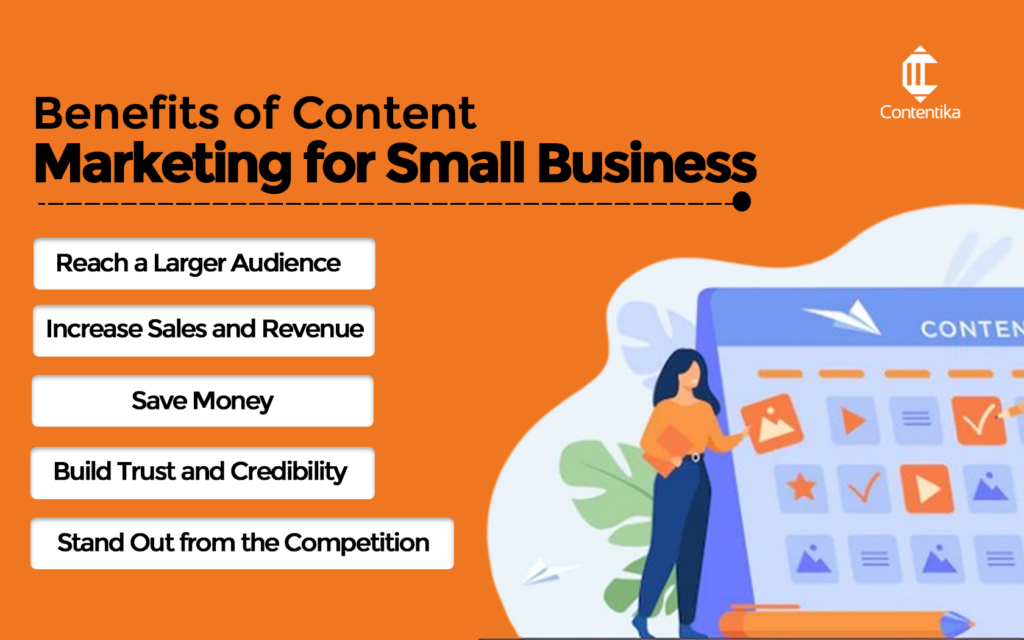
Content marketing strategy is highly beneficial to small business owners. Not only does it help you reach a larger audience, but it also allows you to build trust and credibility with your target market.
Content marketing is an extremely powerful tool for growing your business when done correctly. Some of the benefits of the content marketing program for small businesses include the following:
Reach a Larger Audience
Content marketing allows you to reach a larger audience than traditional advertising techniques. By creating and distributing high-quality content, you’ll be able to attract new visitors to your website and expand your reach.
Build Trust and Credibility
You’ll build trust and credibility with your target trade by providing helpful and informative content. This is extremely important for small businesses looking to establish themselves in the industry.
This can also be done by publishing high-quality, informative content that helps them solve their problems. As you establish yourself as an expert in your field, people will be likelier to buy from you and recommend you to others.
Increase Sales and Revenue
If you can generate more traffic to your website, you’ll also be able to increase sales and revenue. Content marketing can be a great way to boost your bottom line. Also, consistently providing valuable content to your audience will build their loyalty and trust. This can lead to repeat customers and long-term success for your business.
Save Money
Content marketing is a cost-effective way to reach your target market. When done correctly, it can save money on traditional advertising techniques, like print or television commercials.
About 42% of B2B marketers
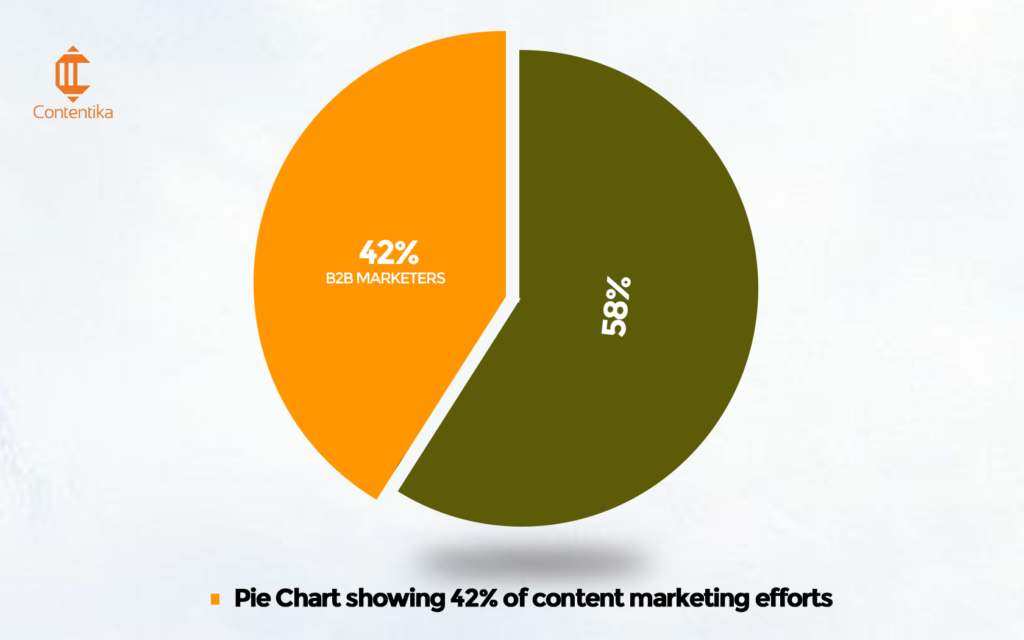
reported that their content marketing efforts had reduced the need for paid advertising.
It’ll also allow you to track your results and see a return on investment, making it easier for you to allocate your budget and make smart business decisions.
Stand Out from the Competition
In today’s competitive marketplace, small businesses need to stand out from the crowd. Content marketing can differentiate your business from competitors and make a name for yourself in the industry.
Content marketing can be an extremely effective way to grow your small business. If you want to reach a larger audience, build trust and credibility, or stand out, consider using content marketing as part of your overall marketing strategy.
How to Create a Small Business Marketing Strategy
When marketing your small business, there are different excellent content marketing strategies that you can employ. The key is finding the right mix of techniques for your company and testing and tweaking your approach constantly.
Start a Blog
Starting a blog is one of the most cost-effective methods to market your small business. Relevant blog articles allow you to share your expert knowledge with a broader audience and attract new customers and clients. Plus, well-written blog content can help to build your brand and reputation.
It also gives your audience a reason to keep visiting your website and familiarize themselves with your product or service.
Build a Social Media Presence
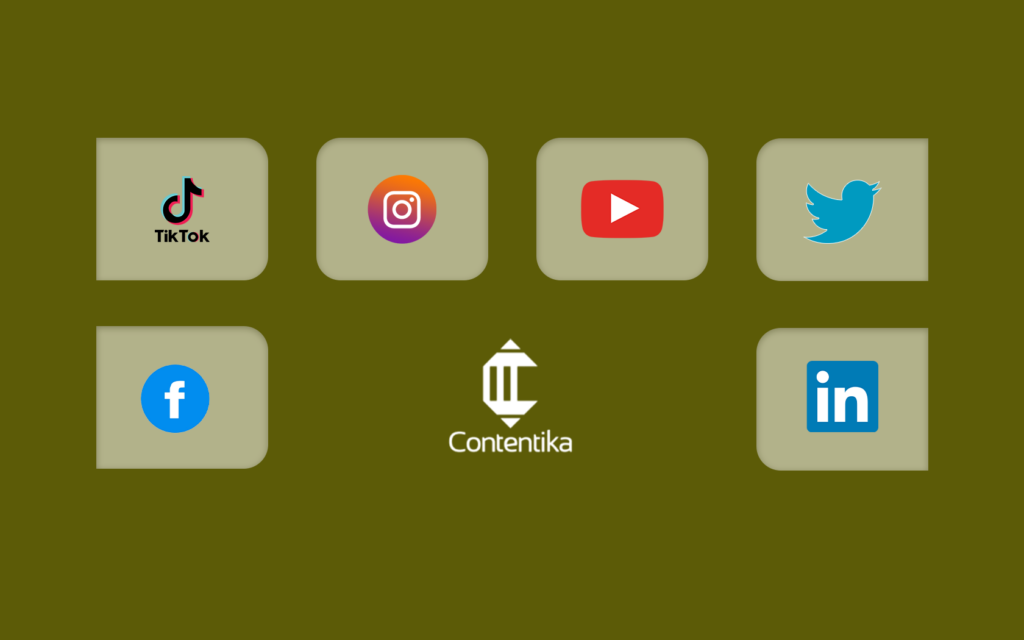
Social media is an excellent way to reach a larger audience and generate new leads for your small business. Creating quality content and posting regularly is crucial when using social media for marketing.
Plus, you should take advantage of social media advertising. Many platforms offer affordable advertising options that can help you reach a wider audience.
When creating your social media marketing strategy, consider which platforms your audience is most active on and focus your efforts there.
You don’t need to be active on every platform; choose the ones that make the most sense for your business. For example, representing a gym & fitness brand using SM platforms like Instagram or TikTok would likely be more effective than LinkedIn because those platforms are visually focused.
Know Your Target Audience
You must understand your target audience before creating content that resonates with your audience. Consider the following when trying to identify your target audience:
- Who are you trying to reach?
- What are their needs and wants?
- What are their pain points?
- How can you help them?
Once you understand your target audience, you can create content that appeals to them.
Plan Your Content
Content creation is one of the most important aspects of a successful blogging strategy. But before you start cranking out content, it’s essential to take some time to plan your content.
When creating content for your business, Consider the topics you want to write about and the needs of your audience. What information do they need? What problems can you help them to solve?
It’s essential to plan and have a strategy in place. It will help you ensure your content is relevant and engaging for your audience.
Develop a Content Calendar

Developing a content calendar is essential before you start creating quality content.
A content calendar will help you keep track of your content creation strategy, publish dates, and deadlines. It can be a lifesaver when things get busy. Plus, it can help to keep your content strategy on track.
To create a content calendar, create a spreadsheet with the following information: Topic ideas, publish date, deadline, link to the published post, and notes. Keeping track of your content this way ensures that your small business online content is constantly churning out fresh and relevant content.
Create Compelling and Relevant Content
Once you know who you’re writing for and what topics you’ll cover, it’s time to start creating compelling and relevant content.
If you choose to create blog articles, keep the following in mind:
- Be clear and concise
- Use strong headlines
- Write in a natural, conversational tone
- Include images, infographics, and videos
- Edit and proofread your work
Following these tips can create high-quality content that resonates with your audience.
Leverage User-Generated Content
In addition to creating your SEO-optimized content, you can leverage user-generated content (UGC) to help market your small business. UGC is any content strategy users or customers create, such as online reviews, posts, or product photos.
Encouraging your customers and clients to create UGC can be a great way to get free publicity for your business. Plus, UGC can help to build trust and credibility with potential customers.
To encourage UGC, you can:
- Create social media hashtags
- Run contests and giveaways
- Include user-generated content on your website or blog
- Use UGC in your marketing campaign
Keep Your Content Fresh
One of the most important aspects of content marketing for small businesses is to keep your content strategy fresh. This means publishing new and relevant content regularly. Not only will this help to attract new readers and customers, but it will also keep your existing ones coming back for more.
There are several ways to ensure that your content stays fresh. One is to regularly update your blog or website with new articles, tips, or resources. Another is to participate in online discussions and forums related to your industry. Finally, you can also offer freebies or discounts to encourage people to visit your site more often.
Make Your Content Shareable
When you create great content, people will want to share it. Ensure your website has social sharing buttons so readers can easily share your work. You can also add a call-to-action at the end of each piece of content, asking people to share it with their networks.
In addition to making your content shareable, you should ensure that it is easy to read and digest. Breaking up your text with subheadings, bulleted lists, and images will make it more skimmable and more likely to be shared.
Use a Variety of Content Types
Content marketing for small business owners can’t be all blog posts and infographics. To capture your audience’s attention, you need to mix things up. Use a variety of other content types, including:

- Video content
- Podcasts
- Whitepapers
- Case studies
- Ebooks
And don’t forget about using social media to share your content. Platforms like Twitter, Facebook, and LinkedIn are great for getting your content in front of new people. Ensure you’re sharing high-quality, engaging content that resonates with your audience.
Promote Your Content Offline
Just because most of your content lives online doesn’t mean you can’t use it to support your offline marketing efforts. For instance, if you own a company for real estate investors, you can use your blog posts and other online content to drive traffic to your physical location.
You can also use your content to promote events or workshops that you’re holding offline. By using a variety of marketing channels – both online and offline – you can reach a wider audience and get more people interested in what you offer.
Be Consistent with Your Content Marketing Strategy
The most important thing you can do to be successful with content marketing is to be consistent with your strategy. It’s not enough to create great content; you need to be consistent to see results.
That means publishing new content regularly, sharing it across your social media channels, and promoting it through other channels like email marketing and paid advertising.
If you’re not consistent, your audience will quickly lose interest, and you’ll miss out on the opportunity to build a loyal following. So make sure you have a solid plan in place and that you stick to it!
Measure and Analyze Your Results
The final step in any content marketing strategy is to measure and analyze your results. This will help you determine what’s working and not so you can adjust your plan as needed.
To measure your results, start by setting some goals. What do you want to achieve with your content marketing? Do you want to increase brand awareness, drive traffic to your website, or generate leads? Once you’ve set some goals, you can start tracking the necessary data.
16 Tips for Effective Small Business Content Marketing
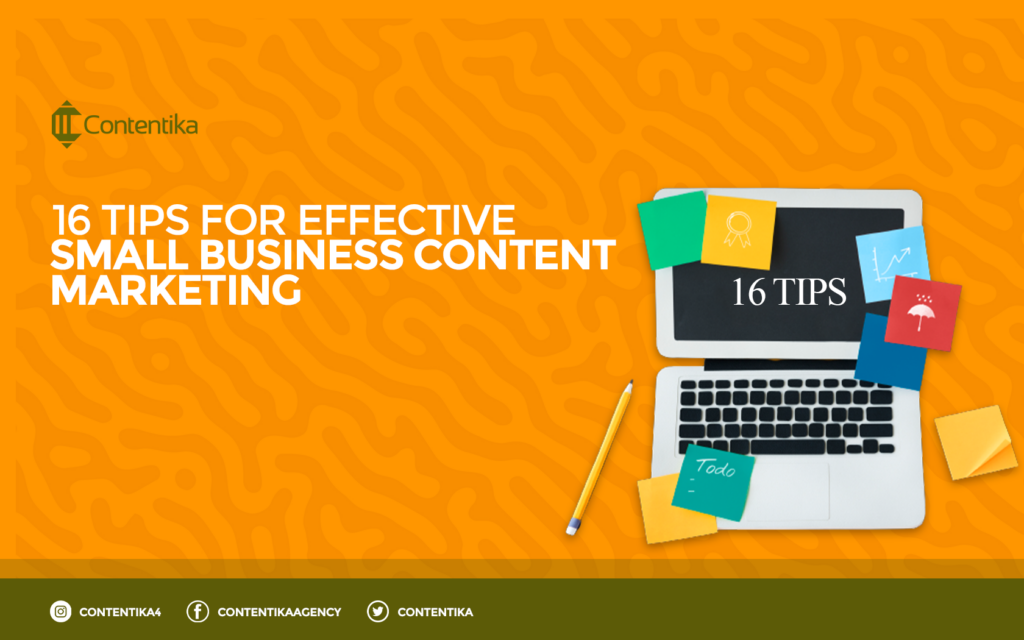
As a small business owner, you know content marketing ideas are essential. After all, without compelling content, you wouldn’t be able to attract more customers and build your brand. But what are the best ways to go about small business content marketing strategy
Here are 16 tips to help you get started:
Define Your Goals
Before you start creating any kind of content, you must know what your business goals are. What are you hoping to achieve with your content marketing ideas? Once you clearly understand your goals, you can create content aligned with them.
Some possible goals for small business content marketing include:
- Increasing brand awareness
- Generating leads
- Boosting sales
- Improving customer retention
Guest Blogging
Guest blogging is a great way to expand your reach and build relationships with other industry experts. Look for blogs and websites with a similar audience to yours and pitch them on writing a guest post for their site.
Ensure you include links to your website in your guest post and author bio. This will drive traffic to your site and help improve your search engine rankings. Don’t forget to promote your guest posts on your social media channels.
Guest blogging is also an excellent opportunity to showcase your expertise and establish yourself as a thought leader in your industry. So don’t be afraid to pitch the most prominent blogs and websites – you never know where it may lead.
Keep it Simple
When it comes to small business content marketing strategy, less is more. You don’t need to create long-winded blog posts or detailed infographics. Keep your content simple and to the point. This will help capture your audience’s attention and improve brand recognition.
Write Compelling Headlines
Your headline is the first thing people will see, so it’s essential to make it count. Write headlines that are clear, concise, and compelling.
Some tips for writing effective headlines include:
- Make sure your headline accurately reflects the content of your article
- Use numbers and statistics in your headlines
- Ask a question in your headline
- Include a keyword or phrase
- Use strong verbs
- Make it scannable
Be Concise
Being concise simply means getting your point across quickly and without taking up too much space. It can be difficult, especially if you’re used to writing for a more traditional medium like print or television.
But it’s important to remember that people have shorter attention spans online, so you must ensure your content is easy to skim and quickly get the point. Another way to be concise is to use bullet points or lists whenever possible.
Focus on Benefits
When writing your small business content marketing, focus on your products or services’ benefits. It will capture your target audience’s attention and convince them to do business with you.
Some businesses make the mistake of focusing too much on features, which can be tedious and off-putting. Yes, your target audience wants to know what your product or service can do, but they’re more interested in how it can benefit them.
For example, let’s say you own a business that sells health supplements. Your target audience is probably interested in improving their health, so focus on your supplements’ benefits, such as more energy, better sleep, etc.
Tell a Story
People love stories. Whether it’s a news article, a blog post, or a social media update, sharing a story is a great way to connect with your audience and make them feel like they’re part of something bigger.
When creating content for your small business online, remember how you can weave a tale that will engage your readers and make them want to return for more. To start, try thinking of a time when your business went above and beyond for a customer or made someone’s day.
You can also share stories about your employees or highlight customers who are raving fans. Whatever story you tell, make sure it will resonate with your audience and leave them wanting more.
Use Strong Calls to Action
Ensure your calls to action are clear, direct, and easy to follow. A strong CTA will tell your audience exactly what you want them to do next, whether signing up for your newsletter or visiting your website.
Your CTAs should be:
- Clear: Tell your audience exactly what you want them to do
- Direct: Use strong, active language that encourages your audience to take action
- Easy to follow: Keep your CTAs simple and easy to understand
Create Engaging Visuals
One of the best ways to stand out in today’s oversaturated market is to create eye-catching visuals that engage viewers emotionally. People are visual creatures, and studies have shown that we process images 60,000 times faster than text.
Regarding social media, posts with images receive 2.3 times more engagement

than those without. There are several ways to make your visuals pop. You can use bright colors, attractive fonts, or even incorporate humor. Make sure your visuals are attention-grabbing and engaging, no matter your approach.
Repurpose Content
Repurposing your content is one way to get the most out. This means taking a piece of content and using it in multiple ways. For example, you could turn a blog post into a podcast episode or video.
You could also take old blog content and update it with new information. This is a great way to get more mileage from your quality content and ensure it reaches as many people as possible.
Curate Industry News
Your small business isn’t the only one in your industry. There are probably thousands of other businesses selling similar products or services. But that doesn’t mean you can’t stand out from the crowd.
One way to do that is to curate industry news on your website or blog. It shows you’re up-to-date on what’s happening in your industry and have something valuable to say.
Not only will this help you attract new readers and followers, but it will also help you gather organic traffic on social media. And when you share news from other businesses in your industry, you’ll create a sense of community and collaboration.
Incorporate Video Content
Video content is becoming more and more popular, especially on social media. According to a 2018 study by Wyzowl, 81% of businesses used video as a marketing tool in 2017, and 99% of those businesses say they plan to continue using video in the future.
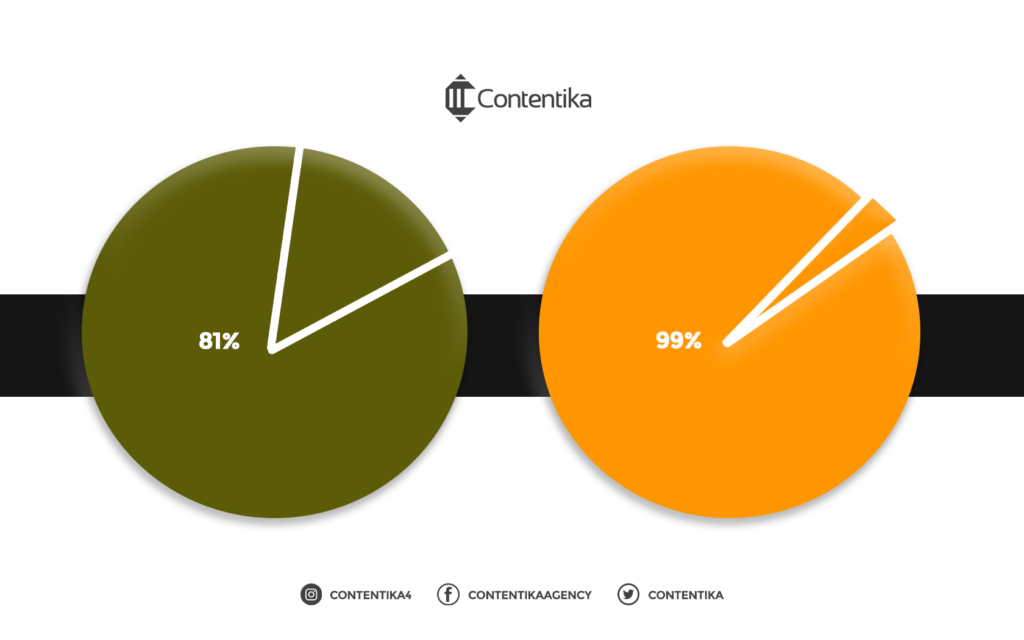
As a small business, you may not have the resources for high-budget video production. But that doesn’t mean you can’t incorporate video into your content marketing efforts. Try using live videos on social media, creating instructional videos, or interviewing industry experts and posting them on your website or YouTube channel.
Host a Webinar or Podcast
Hosting a webinar or podcast is another great way to generate leads and build your audience. It is a great way to show off your expertise and attract more customers interested in what you have to say.
Webinars are especially effective at generating leads because you can offer attendees something of value, such as a free e-book or white paper, in exchange for their contact information. Podcasts are also great for building your brand and attracting new listeners.
If you’re unsure where to start, search for webinars or podcasts relevant to your industry or niche.
Email Marketing
Email marketing is one of the most effective ways to reach your audience. It’s also one of the best ways to nurture leads and convert them into customers.
To start with email marketing, you must build a list of subscribers. You can ask people to sign up for your newsletter or provide an incentive, such as a discount or free shipping.
Once you have a list of subscribers, you can send them regular emails with updates, offers, and other content that will help nurture them into customers.
Write an eBook or Whitepaper
As a small business, you may not have the time or resources to produce an entire eBook or whitepaper. However, there are plenty of opportunities to collaborate with other companies or experts in your field to create content that will be valuable to your target audience.
For example, if you’re a local business, you could collaborate with a nearby hotel to produce visitors’ guidebooks. Or, if you’re a B2B company, you could collaborate with another business in your industry to create a whitepaper on a relevant topic.
Use Interactive Content
As a small business, you know that content marketing is essential to driving traffic and engagement. But what content ideas should you create to capture your audience’s attention?
One excellent option is interactive blog content, including quizzes and polls, infographics, and games. Interactive content is a great way to get people engaged and interested in your words.
Plus, it’s a great way to collect data about your audience and drive profitable customer action, which can be used to improve your future marketing campaigns.
Conduct an Online Contest
An online contest is a great way to generate buzz and excitement for your small business. Make sure to promote your contest heavily through social media channels, email marketing, and other marketing channels. You can also use an online contest to collect valuable customer data and drive organic traffic to your site.
You must set clear rules and objectives to run a successful online contest. You’ll also need to promote your competition heavily and make it easy for people to enter.
Here are a few ideas for online contests that you can use to promote your small business:
- Social media contest: Ask people to share your content on social media for a chance to win
- Photo contest: Ask people to submit photos of your business or products
- Video contest: Ask people to submit video content related to your business or products
- Essay contest: Ask people to write essays about your business or products
Develop a Brand Ambassador Program
A brand ambassador program is a great way to get your customers to promote your business. Brand ambassadors are typically enthusiastic customers willing to share their positive experiences with your business with their friends and followers.
As a small business, you may not have the resources to hire a full-time marketing team. But by leveraging the power of your customers, you can create a low-cost marketing force that can significantly impact your bottom line.
How Can Small Business Owners Outsource Content Marketing?
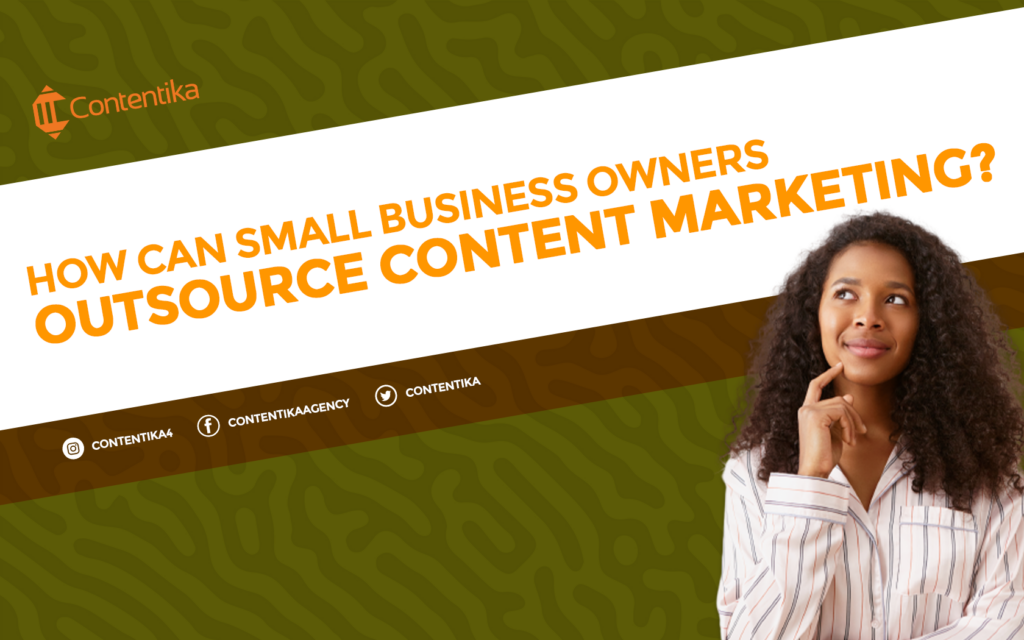
As a small business owner, there’s a good chance that you don’t have the time or resources to invest in content marketing. That’s where outsourcing comes in. Content outsourcing is not a new concept.
Large businesses have been doing it for years, and more recently, small businesses are catching on to the benefits of outsourcing content marketing tasks. Here’s how small business owners can outsource content marketing:
Decide What Type of Content You Need
Before outsourcing your content marketing, you must decide what content you need. Do you need blog posts, articles, social media posts, or something else? Many types of content can be used for marketing purposes, and the type you need will depend on your business goals.
For example, to generate leads, you’ll need content designed to attract attention and get people to sign up for your email list. On the other hand, if you’re looking to build brand awareness, you’ll need informative and shareable content.
Once you know what content you need, you can look for a content marketing agency or freelancer to produce that content.
Set Your Budget

Before you can outsource your content marketing, you need to set a budget. How much are you willing to spend on content marketing? This will determine the scope of your outsourcing.
Assuming you have a limited budget, there are many ways to outsource your content marketing. One option is to hire a freelance writer. Many websites allow you to post your job and receive bids from freelance writers. Once you select a writer, you can provide them with specific instructions and guidelines.
You may consider outsourcing your entire content marketing operation if you have a larger budget. This includes everything from strategy to implementation to distribution. Some agencies specialize in this type of work, and they can be very effective if used correctly. Of course, this option is also more expensive than the others.
Find an Agency or Freelancer That Fits Your Needs

When choosing an agency or freelancer, finding one that fits your needs is essential. You’ll want to consider budget, skillset, and experience factors. Once you’ve found a few potential candidates, be sure to ask for samples of their work to get a sense of their style and quality.
Once you decide on an agency or freelancer, you can outsource your content marketing tasks. These tasks might include developing a content strategy, creating blog posts and articles, managing social media accounts, and measuring results. By outsourcing these tasks, you can free up your time to focus on other aspects of your business.
Negotiate Terms and Conditions
Once you’ve found an agency or freelancer you want to work with, One important thing to remember is that you’ll need to be clear about the terms and conditions of your arrangement with the content marketing firm you’re outsourcing to.
Be sure to discuss what type of content will be produced, how often it will be produced, who will have final approval, and so on. You can avoid any misunderstandings or disagreements by being clear about these details from the outset.
Another thing to remember is that you may need to offer additional compensation for rush jobs or last-minute changes. Be sure to discuss these possibilities with the content marketing firm so that you can agree on what’s fair.
Get Started With Content Marketing
Outsourcing content marketing can be an excellent way for small business owners to get the quality content they need without spending the time and resources to produce it themselves. Following the steps above, you can find an agency or freelancer that fits your needs and get started with content marketing.
11 Content Marketing Platforms to Boost Your Business
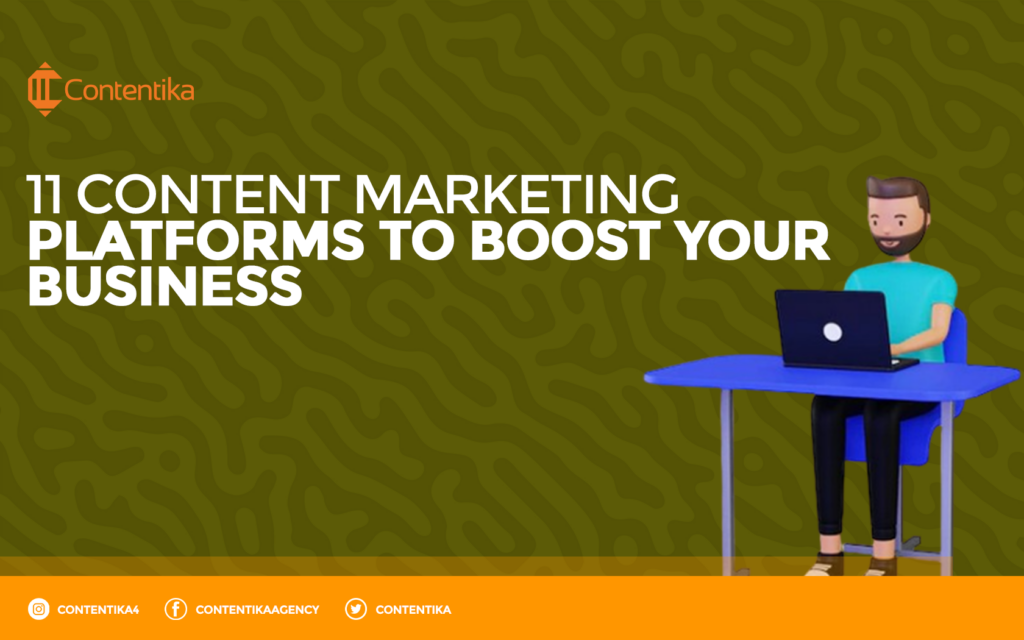
There are several different content marketing platforms out there that can help you boost your business. Here are 10 of the most popular:
WordStream
WordStream is a content marketing platform that helps businesses create and optimize their content for SEO (Search Engine Optimization) purposes by creating keyword-optimized content rank higher in search engines. It also provides users with tools to help them measure their results and track their progress over time.
HubSpot
HubSpot is a comprehensive marketing platform that offers various features, including content management and analysis tools. It also allows users to track their leads and customers and create and automate online marketing campaigns.
WordPress
WordPress is a popular content management system (CMS) that helps businesses create and manage their websites and blogs. It offers users a variety of features, including plugins and themes that can help extend its functionality.
Social Media
Social media platforms like Facebook, Twitter, LinkedIn, or your youtube channel offer businesses a way to connect with their customers and create content that can be shared with a broader audience. These platforms can also be used to track metrics and analyze results. Open social media accounts and start creating valuable content to boost your business.
Semrush
Semrush is a digital marketing platform that offers various features, including content marketing. It helps businesses research and analyze their competitors, track their progress, and create and manage campaigns.
StoryChief
StoryChief is a content marketing platform that helps businesses create, publish, and optimize their content for SEO purposes. It also allows users to collaborate with team members and track their progress. With StoryChief, small businesses can streamline their content creation process and focus on producing high-quality, engaging content that will reach their target audience.
RockContent (formerly ScribbleLive)
RockContent (formerly ScribbleLive) is an excellent option for small businesses because it offers an all-in-one content management system that is easy to use and provides users with predictive analytics and powerful content creation and distribution tools.
Plus, with its social media manager and ability to track conversions, RockContent makes it easy for small businesses to measure the success of their content marketing efforts.
CoSchedule
CoSchedule is a platform that helps you with editorial calendar planning and social media marketing. With CoSchedule, you can create tasks, add discussions, and assign tasks to team members.
Plus, its handy ReQueued feature lets you identify and repost popular content. So if you have a blog post published a while ago but is still relevant and famous, you can easily repost it on your social media profiles.
Contently
Contently offers brands everything they need to plan and create great content, engage with their audience, and measure their success.
Brands that use Contently can connect with their audience more personally and authentically, leading to better engagement and results.
Some of the benefits of using Contently include:
- Increased brand awareness
- Improved engagement with target audiences
- Greater ROI from content
Kapost (by Upland)
It is a tool that small businesses can use to produce educational content at scale, including buyer’s journey maps and workflows, content calendars, and an editorial style guide.
Percolate
Percolate is an end-to-end CMP offering content, brand, and social media management. Its asset management library lets you store all your existing content in one place, organized by client and into different subcategories or however you need them.
Percolate’s social media scheduling system allows you to sync up all your social platforms and quickly post to each one. The calendar planning tool lets you look at your social content more holistically.
9 Content Marketing Tools for Small Business
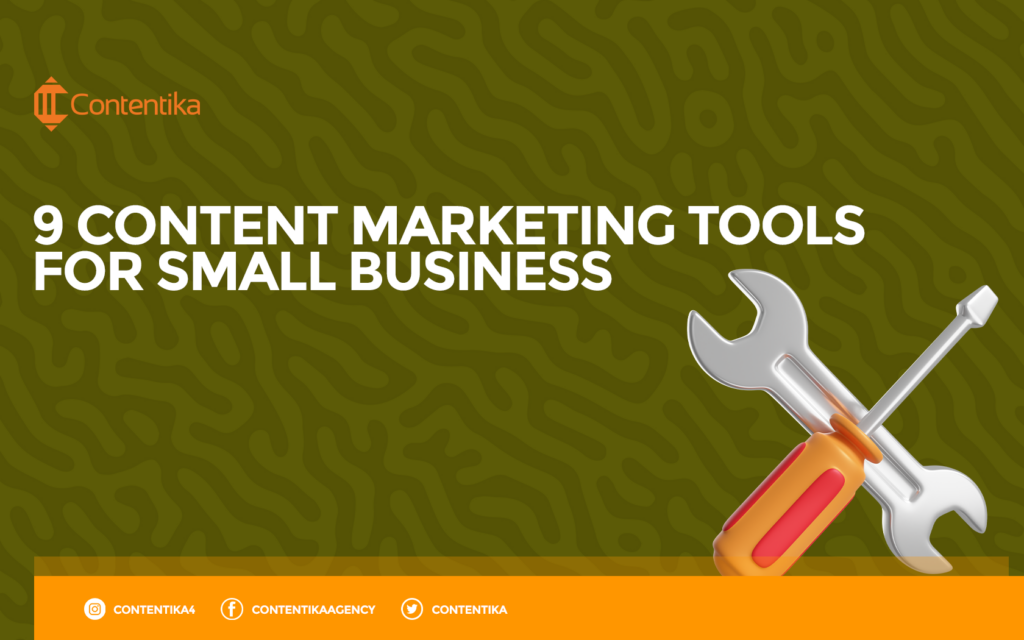
Many content marketing tools are available on the market, but not all of them are created equal. That’s why we’ve compiled a list of the ten best content marketing tools for small businesses, free tools, and paid tools, so you can make an informed decision about which ones are right for you.
Google Sheets
Google Sheets is a free online spreadsheet application that allows you to store and analyze data. It’s ideal for small businesses because it’s easy to use and has many features perfect for content marketing, such as tracking keywords and social media metrics.
Hootsuite Insights
Hootsuite Insights is a free tool that analyzes your social media activity. It’s perfect for small businesses because it gives you insights into what’s working so you can adjust your content marketing strategy accordingly.
Canva
Canva is a free online design platform that allows you to create professional-looking images for your website, social media channels, and more. It’s perfect for small businesses because it’s easy to use and has various templates.
Google Analytics
Google Analytics is a free online tool that allows you to track the performance of your website. It’s perfect for small businesses because it gives you insights into your website traffic, so you can see what type of content drives the most traffic to your site.
Google AdWords Keyword Planner
It is a valuable tool for small business content marketing. By determining the most popular keywords used to find your products or services online, you can create targeted content that will attract more website visitors – and potential customers.
SocialMention
SocialMention is a social media search engine that searches user-generated content for keywords and returns results from over 150 social media sites, including Facebook, Twitter, YouTube channels, and blogs.
BuzzSumo
Use BuzzSumo to research the most popular content on any topic. You can use it to improve your content marketing strategy by understanding what content is most popular on social media and the web.
You can also use BuzzSumo to find influencer marketing in your industry. Follow them and engage with their content to build relationships.
KISSmetrics
It is a tool that allows you to track, analyze, and optimize your website and marketing efforts. It’s an essential tool for any small business owner looking to get the most out of their content marketing efforts.
KISSmetrics provides valuable insights into how people interact with your website, what they’re doing on it, and where they’re coming from. This information is crucial for understanding what content resonates with your audience and what isn’t.
Google My Business
Google My Business is a crucial tool for managing your online presence on Google. It’s perfect for small businesses because it lets you control how your business appears in search results and on Google Maps.
By claiming and verifying your business, you can ensure that your name, address, and phone number are accurate. You can also add photos, hours of operation, and other important information that potential customers want.
Yelp
Yelp is a website and app that allows users to rate and review local businesses. It’s perfect for small businesses because it will enable you to connect with potential customers and build trust.
Make sure you claim your business on Yelp to respond to reviews, publish updates, and take advantage of other accessible features.
FAQs on Small Business Content Marketing
There are a few different ways that small businesses can go about creating custom content. One option is to produce original content in-house, which can be a great way to maintain control over the quality and voice of your message. Another option is to hire outside help, whether working with freelancers or partnering with an agency.
Content marketing can help small businesses in several ways. Perhaps most importantly, it can reach and engage new customers. It can also build relationships with existing customers and create a more favorable perception of your brand.
The seven content marketing steps are Planning, creating, publishing, distributing, promoting, measuring, and continuously improving.
The five essential elements of a content marketing strategy include a clear and defined target audience, a distinctive and valuable brand voice, compelling and original content ideas, an effective distribution strategy, and measurable goals and KPIs.
Some ideas for content marketing for small businesses include creating blog posts, ebooks, infographics, and webinars. All of these pieces of content can attract attention from potential customers and clients and ultimately generate leads and sales.
Wrap Up
Content marketing can be a great way to grow your small business. Small businesses can see accurate results in terms of leads and sales by creating compelling and original content and distributing it through an effective distribution strategy.
When you produce quality content regularly, you’ll find that your audience will begin to trust you as a source of information and advice. This trust can eventually lead to sales and loyalty among your customer base and increased organic website traffic.
With a clear understanding of this ultimate guide on content marketing for small businesses, you can start implementing your content marketing strategy and see the results yourself.
Remembering quality content and strong thought leadership can help your business stand out, be patient and consistent, and consistently produce quality content. If you do that, you’ll soon see your small business growing in ways you never thought possible.
CONTENT MARKETING PLAN TEMPLATE
Planning your content allows you to save time and resources in your content marketing efforts. Here is a simple template to follow when mapping out your short-term and long-term content marketing plans.
Download For Free












